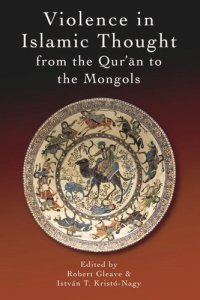
Ebook: Violence in Islamic Thought from the Qurʾan to the Mongols
Author: Robert Gleave, István Kristó-Nagy
- Year: 2015
- Publisher: Edinburgh University Press
- Language: English
- pdf
Examines how violence was described and evaluated in the foundational texts of Islam
Read and download the introduction for free here (pdf)
How was violence justified in early Islam? What role did violent actions play in the formation and maintenance of the Muslim political order? How did Muslim thinkers view the origins and acceptability of violence? These questions are addressed by an international range of eminent authors through both general accounts of types of violence and detailed case studies of violent acts drawn from the early Islamic sources. Violence is understood widely, to include jihad, state repressions and rebellions, and also more personally directed violence against victims (women, animals, children, slaves) and criminals. By understanding the early development of Muslim thinking around violence, our comprehension of subsequent trends in Islamic thought, during the medieval period and up to the modern day, become clearer.
Key Features
- Examines the portrayal of violence in a variety of different intellectual contexts
- Takes a broad understanding of violence – from warfare between Muslims (and between Muslims and others) to individual acts of violence
- Enables a better informed debate about the nature of violence in early Islam
- Includes contributions from leading international experts including Michael Cooperson, Maribel Fierro, Geert Jan van Gelder, Christopher Melchert, John Nawas, Andrew Rippin and Dominique Urvoy